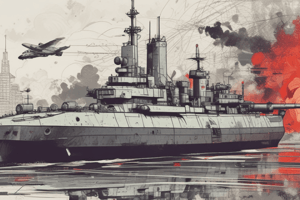Podcast
Questions and Answers
What is the concern about the Soviet Union's conventional actions in Western Europe?
What is the concern about the Soviet Union's conventional actions in Western Europe?
What is the consequence of a threat of unrestricted general war?
What is the consequence of a threat of unrestricted general war?
Why is the present-day diplomacy based on the deterrent value of atomic power in danger?
Why is the present-day diplomacy based on the deterrent value of atomic power in danger?
What is the purpose of being ready to fight limited wars with limited objectives?
What is the purpose of being ready to fight limited wars with limited objectives?
Signup and view all the answers
What is the concern about the US being deterred from initiating nuclear use?
What is the concern about the US being deterred from initiating nuclear use?
Signup and view all the answers
What is the concept that 'massive retaliation' will have to be openly recognized as obsolete?
What is the concept that 'massive retaliation' will have to be openly recognized as obsolete?
Signup and view all the answers
What is a crucial aspect of limiting aims in conflict?
What is a crucial aspect of limiting aims in conflict?
Signup and view all the answers
How can an understanding of an adversary's thresholds be reached during a conflict?
How can an understanding of an adversary's thresholds be reached during a conflict?
Signup and view all the answers
What is an essential aspect of preventing accidental escalation?
What is an essential aspect of preventing accidental escalation?
Signup and view all the answers
What is an example of a situation where escalation was avoided?
What is an example of a situation where escalation was avoided?
Signup and view all the answers
Why is it important to understand an adversary's thresholds?
Why is it important to understand an adversary's thresholds?
Signup and view all the answers
What is the purpose of understanding an adversary's current thresholds?
What is the purpose of understanding an adversary's current thresholds?
Signup and view all the answers
What was the reason behind the avoidance of escalation in the mentioned historical incident?
What was the reason behind the avoidance of escalation in the mentioned historical incident?
Signup and view all the answers
What is the primary goal of nuclear weapons in the concept of 'existential deterrence'?
What is the primary goal of nuclear weapons in the concept of 'existential deterrence'?
Signup and view all the answers
What is the consequence of believing that nuclear weapons can be used as an instrument of national policy?
What is the consequence of believing that nuclear weapons can be used as an instrument of national policy?
Signup and view all the answers
What is the alternative approach to believing that nuclear weapons can be used as an instrument of national policy?
What is the alternative approach to believing that nuclear weapons can be used as an instrument of national policy?
Signup and view all the answers
What is the core idea behind the concept of 'mutually assured destruction'?
What is the core idea behind the concept of 'mutually assured destruction'?
Signup and view all the answers
What is the primary concern of scholars who question the idea of using nuclear weapons as an instrument of national policy?
What is the primary concern of scholars who question the idea of using nuclear weapons as an instrument of national policy?
Signup and view all the answers
What is the significance of understanding the evolution of strategic nuclear doctrine in the context of international security?
What is the significance of understanding the evolution of strategic nuclear doctrine in the context of international security?
Signup and view all the answers
What is the central theme of the concept of 'mutually assured destruction'?
What is the central theme of the concept of 'mutually assured destruction'?
Signup and view all the answers
How does the concept of 'existential deterrence' differ from other nuclear deterrence strategies?
How does the concept of 'existential deterrence' differ from other nuclear deterrence strategies?
Signup and view all the answers
What is the primary goal of arms control agreements in the context of nuclear warfare?
What is the primary goal of arms control agreements in the context of nuclear warfare?
Signup and view all the answers
What is the significance of the concept of 'limited war' in the context of nuclear strategy?
What is the significance of the concept of 'limited war' in the context of nuclear strategy?
Signup and view all the answers
What is the significance of understanding the concept of limited war in the context of nuclear strategy, and how does it relate to the goal of preventing accidental escalation?
What is the significance of understanding the concept of limited war in the context of nuclear strategy, and how does it relate to the goal of preventing accidental escalation?
Signup and view all the answers
What is the core idea behind the concept of 'existential deterrence', and how does it differ from other nuclear deterrence strategies?
What is the core idea behind the concept of 'existential deterrence', and how does it differ from other nuclear deterrence strategies?
Signup and view all the answers
What is the primary goal of arms control agreements in the context of nuclear warfare, and how do they contribute to international security?
What is the primary goal of arms control agreements in the context of nuclear warfare, and how do they contribute to international security?
Signup and view all the answers
What is the significance of understanding the evolution of strategic nuclear doctrine in the context of international security, and how has it impacted the development of deterrence strategies?
What is the significance of understanding the evolution of strategic nuclear doctrine in the context of international security, and how has it impacted the development of deterrence strategies?
Signup and view all the answers
What is the purpose of being ready to fight limited wars with limited objectives, and how does this concept relate to the theory of nuclear war?
What is the purpose of being ready to fight limited wars with limited objectives, and how does this concept relate to the theory of nuclear war?
Signup and view all the answers
What is the concern about the US being deterred from initiating nuclear use, and how does this relate to the concept of mutually assured destruction?
What is the concern about the US being deterred from initiating nuclear use, and how does this relate to the concept of mutually assured destruction?
Signup and view all the answers
What is the underlying assumption of limited war strategy according to Osgood and Kaufmann?
What is the underlying assumption of limited war strategy according to Osgood and Kaufmann?
Signup and view all the answers
What are the key operational limits emphasized in the concept of limited war?
What are the key operational limits emphasized in the concept of limited war?
Signup and view all the answers
What type of military systems and strategies were considered ideal for limited war?
What type of military systems and strategies were considered ideal for limited war?
Signup and view all the answers
What was the greatest challenge for Osgood in the context of limited war?
What was the greatest challenge for Osgood in the context of limited war?
Signup and view all the answers
What is the importance of distinguishing between strategic and tactical means and targets in limited war?
What is the importance of distinguishing between strategic and tactical means and targets in limited war?
Signup and view all the answers
What is the role of ground forces in limited war, according to Kissinger?
What is the role of ground forces in limited war, according to Kissinger?
Signup and view all the answers
Study Notes
Limited War and Limited Nuclear War Options and Strategies
-
Obsolescence of Massive Retaliation: Bernard Brodie argues that the concept of massive retaliation will become obsolete when an opponent can retaliate with similar nuclear power, rendering it ineffective in deterring attacks on vital interests.
-
Deterrence and Limited War: Brodie suggests that limited wars with limited objectives are necessary to avoid unlimited disaster, as total war is a catastrophe with no predictable limits.
-
Assumptions about the Other Side: The Soviet Union might not be deterred by the US nuclear retaliatory capability, and the US might be deterred from initiating nuclear use due to the Soviet ability to retaliate.
-
Limiting War: Osgood proposes limiting war by controlling:
- Limiting aims
- Means employed
- Number of participants
- Geographic area
- Selected targets
- Temporal scope
- Extent of disruption (economic, social, political)
-
Preventing Escalation: To prevent escalation, it is essential to understand the adversary's thresholds and communicate policies clearly to avoid accidental or deliberate escalation.
-
The Bari Incident (1943): An American ship carrying mustard gas was hit in a German bombardment, releasing the gas, but the incident did not escalate due to the US and UK keeping it secret, rather than trust and communication.
Fundamental Questions on Nuclear Weapons
- Role of Nuclear Weapons beyond Existential Deterrence: Can nuclear weapons be used as an instrument of national policy to advance goals beyond deterrence, or are they limited to existential deterrence?
- Policies and Strategies: If yes, it leads to policies focused on manipulation of risk, development of specific forces, and capabilities for limited nuclear war. If no, it emphasizes nuclear danger, avoiding escalation, and enhancing crisis stability.
Studying That Suits You
Use AI to generate personalized quizzes and flashcards to suit your learning preferences.
Description
This quiz assesses your understanding of limited war and limited nuclear war options and strategies, highlighting the limitations of massive retaliation and the catastrophic consequences of unrestricted general war. Explore the thoughts of Bernard Brodie as cited by Ross, and test your knowledge of wartime politics and international relations. Delve into the complexities of nuclear deterrence and the unpredictable outcomes of large-scale conflict.




